By Eric Atta-Sonno
Introduction
Most Ghanaians associate the 1st October date as the Independence Day for the Federal Republic of Nigeria. Very few however know or remember that this was the day that the Second Republic of Ghana was inaugurated. That Republican experiment only lasted some twenty-seven months. As to whether it was too idealistic or premised on a wrong footing, is left to the judgement of all of us. However, as we mark the day, I have attempted to replay the events of history culminating in the day.
Overthrow of the Nkrumah Government and immediate aftermath

Upon the overthrow of Osagyefo Kwame Nkrumah in February 1966, the military officers that led the coup d’état formed the National Liberation Council to spearhead the military government. The NLC was composed of three Army Officers (Col. Emmanuel Kwasi Kotoka, Maj. Akwasi Amankwaa Afrifa and Brig. Albert Kwei Ocran) and four Police Commissioners (Mr. John Willie Kofi Harley [Inspector General of Police and Vice Chairman of the NLC], Mr. Bawa Andani Yakubu, Mr. Anthony K. Deku [Commissioner of Police, CID] and Mr. J.E.O Nunoo [Commissioner of Police, Administration]). Maj. Gen. Joseph Ankrah who had been retired from the Army by President Nkrumah was invited to chair the NLC, having been promoted to the rank of Lt. General. Automatically, he became the Commander-in-Chief of the Ghana Armed Forces until 3rd April 1969 when he resigned for unclear reasons. In an attempted coup on 17th April 1967, Lt. Gen. E.K. Kotoka was assassinated. In his place on the NLC, Lt. Col. Osei Boateng was appointed.
Lt. Gen. Akwasi Amankwaa Afrifa then became Head of State until hand-over months later. The nature and attitude of the NLC government clearly gave the impression that it was sympathetic towards the ideology of the hitherto Opposition.
The NLC speedily repealed some of the obnoxious laws and decrees passed by the Nkrumah government such as the PDA and the country’s borders opened. This was especially to enable self-acclaimed political refugees who had fled the country for fear of being arrested by Nkrumah government, to return. Dr Kofi Abrefa Busia who had left Ghana in June 1959 took advantage of the reprieve to return in March 1966.
The NLC government took advantage of the goodwill received from the hitherto Opposition and appointed many of its bigwigs to key positions. Dr Busia, for example, was appointed as Chairman of the NLC National Advisory Council. This body which was subsequently re-designated NLC Political Committee had a mandate of advising the government on how best it could stay in touch with the citizenry and better serve its interest. Even though, quite a number of the members were drafted from the former United Party (UP), the government, not wanting to create the impression that it favoured Nkrumah’s opposition, ensured that the members never exceeded a third. On 7th June 1967, the NLC government inaugurated the Centre for Civic Education to facilitate the mood of the nation towards constitutional rule. Again, Dr Kofi Abrefa Busia was subsequently appointed as its Chairman. As he traversed the length and breadth of the country, Dr Busia in undertaking the duties of the Commission became a hugely popular figure.
Preparations for a new Constitution
In December 1968, a draft Constitution for the Second Republic was presented to the NLC by the Constitutional Commission. That Commission had worked upon the premise of the tyrannical posture of the 1964 Constitution, which had among others led to the overthrow of the Nkrumah government. Thus, the underpinnings of the new Constitution was to “establish the sovereignty of the people and the rule of law as the foundation of our society and which shall guarantee freedom of thought, expression and religion, justice – social, economic, political; respect for the dignity of the individual; and equality of opportunity for all citizens”. The Constitution had been determined to operate the Westminster model of constitutional democracy on the strict principle of ‘separation of powers’ between the three arms of State (Executive, Legislature and Judiciary).
Having had this cleared, the NLC appointed a Constituent Assembly whose members were sworn into office on 30th December 1968. The Constituent Assembly had Mr. Robert Samuel Blay as its Speaker with Oklemekuku Nene Azu Mate Kole (Konor of Manya Krobo) as Deputy Speaker in an assembly of 149 members. These included the likes of Mr. Ben Joao da-Rocha, Dr Kofi Busia, Mr. William Ofori Atta, Mr. Saki Scheck, Mr. Victor Owusu, Dr Obed Yawo Asamoah, Mr. Sebastian Kwaku Opon, Dr Frederick Torgbor Sai, Mr. Sam A. Okudzeto, Mr. Charles Omar Nyanor, Nene Anorkwei II (Paramount Chief of Prampram), Dr. Jones Ofori Atta, Mr. Reginald Reynolds Amponsah, Mr. Samuel Ofosu-Amaah, Togbe Adeladza II (Awoemefia of Anlo State), Mr. Peter Ala-Adjetey, Mr. Issifu Ali, Prof. Christian G. Baeta, Bapenyiri Yelpoe II (Jirapa-Na), Mrs Sylvia Boye, Mr. Alexander Apeatu Aboagye Da-Costa, Dr E.V.C. De-Graft Johnson, Dr Joseph William Swain de-Graft Johnson and Mr. Harona Esseku. Some others were Mr. Akenten Appiah-Menka, Mr. Burt Abdulai Fuseini, Mr. Robert Kankam Boadu, Dr Godfred Kportufe Agama, Mr. A.A.Y. Kyerematen, Chief Abayifaa Karbo, Mr. Rowland Atta Kesson, Mr. Jonathan Kwesi Lamptey, Mr. John Agyekum Kufuor, Mr. Henry (Harry) Romulus Sawyer, Mr. E.G. Tanoh and Naa Chiiri I (Nandom Naa).
The Assembly had as its Joint Clerks L.P. Torsu and Kwaku Baah with S.N. Darkwah as the Assistant Clerk. Mr. Justice V.C.R.A.C. Crabbe served as the Assembly’s Legal Draftsman. The core mandate of the Assembly was to deliberate on the draft Constitution and have it passed into law.
While the Constituent Assembly operated, the NLC busied itself with the establishment of other agencies that were required to ensure a smooth return to constitutional rule. The government passed the National Assembly Elections Regulations 1968 (Act 48/9 1) on 11th May 1968. It then established the Electoral Commission with His Lordship Justice Joseph Kwame Kingsley-Nyinah, then a Justice of the Appeals Court as the Electoral Commissioner. One interesting thing about voting in the 1969 Elections was that voters (called electors) used pens to mark ‘X’ by their preferred candidates instead of the use of thumbprints as we do today.

In July 1969, the Constituent Assembly completed is work and approved the new Constitution. One by one, all the 149 members of the Assembly appended their signatures to have the new Constitution promulgated on 22nd of August 1969. Interestingly, a number of the members did so with “Reservation to Article 71, Clause 2(b) ii”. That clause read, “No person shall be qualified to be a member of the (National) Assembly who has been adjudged or otherwise declared by the report of a Commission of Inquiry to be incompetent to hold public office or that while a public officer he acquired assets unlawfully or defrauded the State, or misused or abused his office or wilfully acted in a manner prejudicial to the interests of the State.”

This clause evoked so much passion that as many as twenty-two members expressed their reservation about its inclusion. The reason for this, to date, remain unclear. Perhaps people such as Dr Obed Asamoah and Dr (Mrs) Sylvia Boye will help us appreciate why they appended their signature with reservation.
Activities of Political Parties
Early in 1969, the NLC announced an intention to return the country to constitutional democracy later that year. The ban on political party activities was to be lifted on 1st May 1969. In a decree dated 17th February 1969, the NLC had however determined that key functionaries of the erstwhile CPP government of Dr Nkrumah could not contest. This was in line with the report of the Apaloo Commission which is said to have recommended a ban for a category of the Nkrumah government appointees. The NLC therefore enacted the NLC Decree 345 debarring all senior officials of the previous Nkrumah regime of holding themselves up as Members of Parliament or senior officials of political parties. Affected persons who were still politically active included Mr. P.K.K. Quaidoo, Komla Agbeli Gbedemah, Alhaji Imoro Egala. Certain individuals who had belonged to the Nkrumah regime and whose names are mentioned in a decree of February 17, 1969, are also ineligible.
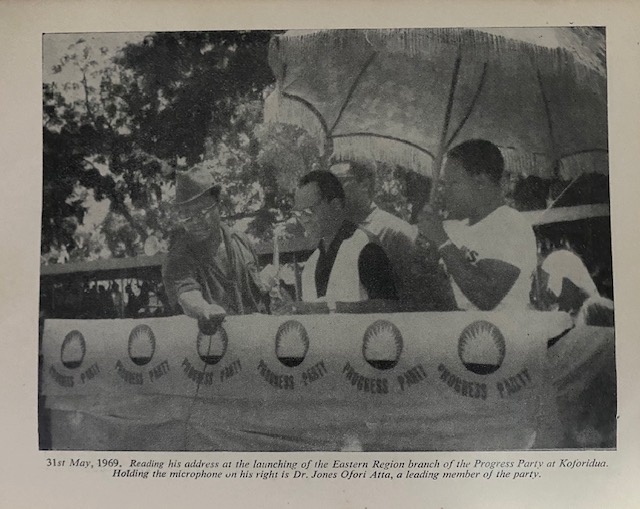
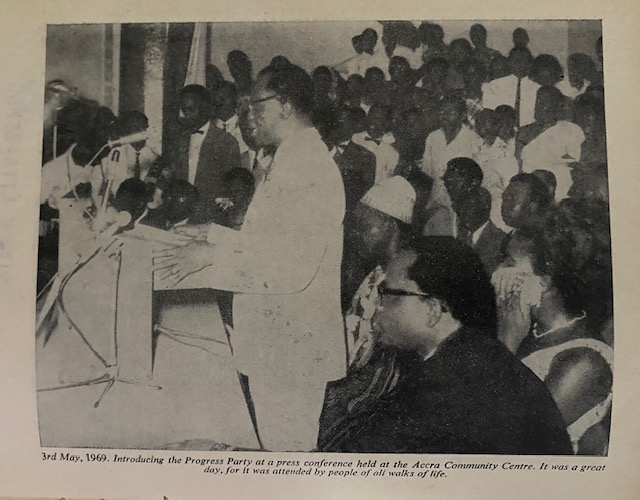
On 2nd of May 1969, Dr Kofi Busia outdoored his Progress Party at a heavily attended Press Conference held at the Accra Community Centre. The General Secretary was Mr. B.G. da-Rocha with Mr. Maxwell Owusu as his deputy.
In his inauguration speech at that event, Dr Busia said, “We conceive our party, the Progress Party, which I have come here today to introduce to the nation, as wholly an instrument – an instrument for serving our nation and generation, an instrument for meeting the human needs and the challenging tasks which call for fulfilment in our particular time and place. Our party, the Progress Party, is a means whereby we who share common views and values, and see alike with regard to the dangers and opportunities facing us, agree voluntarily to come together to combat the dangers, and to use the opportunities to serve our country and our generation, and to make life happier, freer and nobler for us all.
The motto of the Progress Party was, ‘Progress, Unity, Liberty and Justice’ with an emblem of a rising Sun emerging from a dark background. By way of vision, Dr Busia’s mantra was that, “To every Ghanaian, a job; to every work, security; to every family, a decent meal and a decent home; to every person, equal opportunity and social justice; to every individual, the essential freedom of speech and expression, freedom of movement and association, freedom of conscience of worship; and to all Ghanaians, progress”.

Beyond the Progress Party, there were other parties in the election. The National Alliance of Liberals (NAL) was led by Komla Gbedemah (nicknamed Afro-Gbede), while Mr Joe Appiah led the United Nationalist Party. Mr. Imoro Ayarna led the United Action Party (UAP) while the All People’s Republican Party (APRP) was led by Mr. E.V.C. de-Graft Johnson.
The electioneering period recorded very exciting moments. The flamboyance and extravagance of Komla Gbedemah introduced some great excitement into the elections never witnessed in the history of Ghana. Everything pointed to a massive win for NAL but eventually, he was a pale shadow of himself. The campaign format of Mr. Joe Appiah was also not to be done in this as he was very charismatic on stage in his characteristic Ashanti cloth. He was nicknamed ‘Abaa ba seee’ (They will come last) in reference to how his political opponents who appeared to be in a comfortable lead would eventually be disappointed when the ballots were counted. In the end, he ended up being badly battered with the results. The other parties in the election were largely uninspiring in their campaign.
General Structure of the Constitution

As per the Constitution, the Parliament of Ghana was to consist of unitary House called the National Assembly with one hundred and forty members who were to be elected for a five-year tenure. The Speaker who was to preside over the activities of the National Assembly was to be elected either from among members of the House or someone from outside the Parliament who could fulfil the necessary eligibility criteria.
In order to guarantee the liberties of the members of the National Assembly, the new Constitution had ingrained in it a position, ‘Leader of the Opposition’, being the leader of the opposition party with the highest number of seats in the Assembly. His position was to be regulated by Article 73. In return, he was to enjoy two-thirds of the salary and emoluments of the Prime Minister. He was also an automatic member of the Council of State.
Every Ghanaian citizen of either sex who was at least twenty-one years of age and of sound mind had the right to be placed on the electoral roll which was to be revised annually and prepared afresh every ten years. Every Ghanaian citizen was eligible for the National Assembly, provided he was at least twenty-one years old and resident in the constituency for which he was to be a candidate, or had resided there for a minimum of five years in total. The one hundred and forty Members of the National Assembly were to be elected by a simple majority system in as the various constituencies.
The Elections and its Outcome
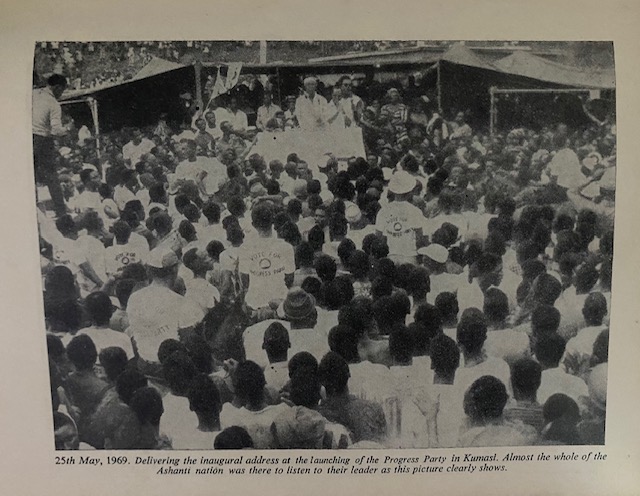
Elections to the National Assembly had the National Alliance of Liberals (NAL), the Progress Party (PP), the United Nationalist Party (UNP), the People’s Action Party (PAP), and the All People’s Republican Party (APRP) contesting. The two dominant parties were however the NAL led by Mr. K.A. Gbedemah, a former CPP Minister who had fallen out with Kwame Nkrumah in 1961 and the PP led by Dr K.A. Busia, the former Leader of the Opposition under the Nkrumah regime who had fled the country for fear of arrest under the Preventive Detective Custody of that government.
The elections held on 29th August 1969, was hotly contested among five political parties and a host of independents. Of a total voter population of 2,361,462, the valid vote cast totalled 1,504,032 representing 64% of valid votes cast. The Progress Party (PP) clinched 105 seats in the National Assembly, having obtained 58.4% of the votes cast. The National Alliance of Liberals (NAL) followed with 30.8% of the votes and 29 seats. The United Nationalist Party (UNP) polled 3.8% votes with the People’s Action Party (PAP) obtaining 3.4% of votes but both of them got two seats each in the National Assembly. The All People’s Republican Party (APRP) polled 1.8% and took a seat in the House in addition to one Independent.
One interesting twist of the results was that Mr. Komla Agbeli Gbedemah, a former CPP Minister who was the Leader of the NAL won his seat in the Keta Constituency. Shortly after taking his seat, he was not permitted to continue as a duly elected member of the Assembly. He took up the case with the Supreme Court which ruled against him, indicating that since there was an enactment. A bye-election held resulted in Albert Gregorio De Souza also of NAL taking the seat.

On 3rd September 1969, Dr Busia in a victory message to Ghanaians, remarked among others: “I say thank you not only to the members of the Progress Party, but also to the members of all the other parties which took part in the elections. I do this sincerely, for I am aware that elections which do not offer a real choice between possible alternatives are meaningless exercises – a mere mockery of the democratic process. By offering alternatives, all the parties have contributed to the important exercise in democracy which we have just completed; so I wish to thank them al. it is an equally essential part of the exercise of democracy that the verdict of the people, so freely and so clearly pronounced, should be accepted by all. The elections are over; let no rancour be allowed to remain in our hearts. We much address ourselves to the achievement of the objectives we all agree that we need and desire: freedom, justice and prosperity.”
Touching on the Second Republic, Dr Busia said, “We are given the chance of a new beginning. Let us enter the Second Republic of Ghana, conscious of the major lessons that the failure of the First Republic has taught us. We failed most in the things of the spirit; in brotherliness and helpfulness and honesty. Our recent experience teaches us that we can succeed if we cultivate honesty ion our respective posts and duties, a concern for other people, a sense of fair play and justice in our relations and a hatred for corruption. These are human virtues which we cannot side-step without catastrophe … Let us start our Second Republic in a spirit of forgiveness and tolerance, determined that this time, we shall succeed in building a truly democratic country in which we shall be proud and happy to live.”
Transition towards the 2nd Republic
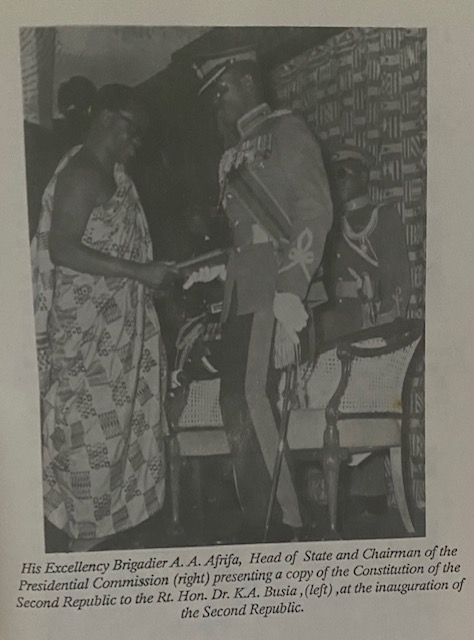
By Article 60 (7), Dr Busia, as leader of the party with the highest number of seats in the National Assembly was proclaimed as the Prime Minister by the government which had established the Presidential Commission in line with the new Constitution. The Presidential Commission was made up of Lt. Gen. Akwasi Amankwaa Afrifa as Chairman with Brig. Albert Kwei Ocran and Mr. J.W.K. Harley (IGP) subsequently to be replaced by Bawa Andani Yakubu as members. This was in line with the First Schedule of Part 1 of the Transitional Provisions of the new Constitution.
The Presidential Commission was inaugurated on 3rd September 1969 by the Chief Justice, His Lordship Justice Nii Amaah Ollenu at the Parliament House. The inauguration of the Commission effectively phased out the National Liberation Council and began the new walk back into constitutional democracy.
The Presidential Commission was in office from 3rd of September to the 7th of August 1970 when it handed over its functions to the Speaker of the National Assembly, Mr. Justice Raphael Nii Amaa Ollenu. He performed the combined functions of Speaker and Chairman of the Presidential Commission until 31st August 1970.
Formation of the 2nd Republican Government
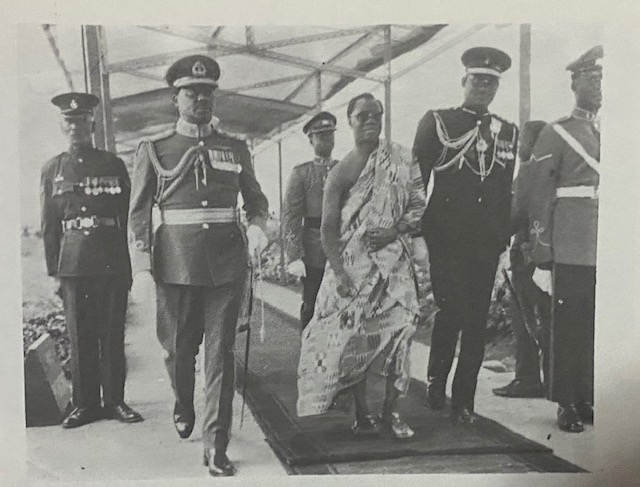
On Wednesday, 1st October 1969, the Second Republic was publicly inaugurated in Accra. The Chairman of the Presidential Commission presented an originally signed copy of the Constitution to the new Prime Minister, Dr Kofi Abrefa Busia.
Addressing the world from the Black Star Square, Dr Kofi Busia declared among others: “You have handed to me, as a symbol of the transfer of power from you to a democratically-elected civilian government, our new Constitution. It is a Constitution which seeks to place the exercise of power under restraint. It is the fruit of our recent experience. It bears the marks of our scars, our fears and our aspirations. Its underlying philosophy is that no man, or group of men, is virtuous enough to hold power without checks. My colleagues and I to whom the nation has freely entrusted that power accept the philosophy which underlies our Constitution. We are conscious of our fallibility as human beings, and we recognize the need to establish and develop institutions which help to tame the unbridled exercise of power. We shall endeavour to uphold the ideals of freedom and justice enshrined in our Constitution.
Power is good or evil according to the vision that it serves. Our vision is that of a democratic welfare society in which everyone is his brother’s keeper. We consider that an important function of the democracy we will endeavour to establish here in our country will be to enlarge our sympathies one for the other, and make our souls more roomy so that our loyalties to our families, tribes, political parties do not divide us as a nation, but rather provide the foundation for the extension of the brotherhood of family or tribe to the wider brotherhood of the nation.”
Having been appointed Prime Minister, Dr Kofi Busia constituted his government who were all required by the constitutional arrangement to be from the National Assembly.
Dr Busia set up a cabinet of seventeen members as per the Constitution. They were Victor Owusu (Justice and Attorney General), J.H. Mensah (Finance), J.K. Lamptey (Parliamentary Affairs), William Ofori-Atta (Foreign Affairs), R.A. Quarshie (Trade, Industries and Tourism), S.D. Dombo (Health), R.R. Amponsah (Education and Sports), S.W. Awuku Darko (Works and Housing), T.D. Brodie-Mends (Lands and Natural Resources), A.A. Munufie (Rural Development and Social Welfare), Jatoe Kaleo (Transportation and Communications), Dr Kwame Safo-Adu (Agriculture), N.Y.B. Adade (Internal Affairs), Dr W.G. Bruce-Konuah (Labour and Co-operatives), and B.K. Adama (Defence).
To complement the cabinet twenty-nine Ministerial Deputies (Deputy Ministers) were appointed. They were J.K. Fynn and Carl Reindorf (Education and Sports), Kwaku Baah (Defence), A. Antwi Kusi (Agriculture), C.O. Nyanor (Finance), Badu Nkansah (Health), Akenten Appia-Menka (Justice and Attorney General), J.A. Kufuor (Foreign Affairs), Justice Boateng and Abdul Saaka (Internal Affairs), A.A. Aboagye da-Costa (Labour and Co-operatives), K.P. Agyekum and Sebastian Opon (Rural Development and Social Welfare), J.G. Amonoo (Lands and Mineral Resources), Stephen Krakue and Osei Akoto and Adama Amandi (Trade, Industry and Tourism), M.K. Osei and Kofi Sackey (Works and Housing), O.K. Opoku (State Protocol), Saki Scheck (Parliamentary Affairs) and Yaw Manu (Transport and Communications). Additionally, Oheneba Kow Richardson and A.A. Abedi (Information), Dr Jones Ofori Atta (Planning) and S.K.C. Osei Baidoo (National Service Corps) were Ministerial Deputies operating from the office of the Prime Minister.
The Regional Chief Executives (Reginal Ministers) that were appointed were Imoru Salifu (Upper), A.A. Owusu (Brong Ahafo), A.K. Adu (Eastern), A.S. Kpodonu (Volta), H.R. Annan (Ashanti), A.E. Chinebuah (Western), J.A. Annobil (Central), J.A. Braimah (Northern) and A.S.O. Mensah (Greater Accra).
The Council of State had thirteen members as follows: Otumfuo Opoku Ware II (Chairman), Dr Kofi Busia (Prime Minister), Gen. Akwasi Afrifa, Nii Amaa-Ollenu (Speaker of National Assembly), Mrs. Emily Hesse, Mrs. Agnes Owusu Nyantakyi, Mr. Erasmus Ransford Tawiah Madjitey (former IGP), Nana Kwamina Anaisie, Oklemekuku Nene Azu Mate Kole (Konor of Manya Krobo), Ya Naa Mahamadu Abdulai IV (Ya-Naa of Dagbon State), Mr. D.J. Buahin, Mr. Nathan Quao, and Archbishop John Kojo Amissah.
The Second Republic was however short-lived as it was overthrown only after twenty-seven months on 13th January 1972 by Col. Ignatius Kutu Acheampong and his battalions. They dissolved the subsequently formed the National Redemption Council (NRC).
Election of the President

In line with Article 41 and Part 1 of the First Schedule of the Constitution, a Presidential Electoral College was convened on 31st August 1970 to elect a (Ceremonial) President for the country. The 164-member Electoral College was made up of all 140 Members of the National Assembly, 24 Chiefs representing the various Regional Houses of Chiefs and representatives of District Councils. Nominations were received for Mr. Justice Edward Akufo-Addo (until then the Chief Justice of the Republic) and Dr I.B. Asafo Adjaye, a former member of the Council of State. After polling, Mr. Edward Akufo-Addo had 123 votes with Mr. Asafo Adjaye obtaining 35 votes.
Mr. Edward Akufo-Addo was sworn into office by Justice Edmund Alexander Lanquaye Bannerman who had just assumed the office of Chief Justice. Hitherto, Mr. Akufo-Addo had previously served as Chairman of the Constitutional Commission that drafted the 1969 Second Republican Constitution as well as being the head of the NLC Political Commission. He had also served as the country’s Chief Justice from February 1966 until his election as President. The election of the President automatically dissolved the existence of the Presidential Commission.
Epilogue: The Man, Dr Kofi Abrefa Busia
Dr Kofi Abrefa Busia was born into the Royal Sofoase Yefri family of the Wenchi Traditional Area on 11th July 1913. He was educated at Mfantsipim School, Wesley College and the Achimota School in Ghana before attending Oxford University.
Dr Busia spent most of his working life teaching and was the first African to become Professor at the University College of the Gold Coast (now University of Ghana). He held professorships in twelve renowned Universities in Europe and the Americas.
He initially got married to Helena Poku, a native of Ashanti Bekwai who predeceased him in July 1947. In August 1950, he married Naa Morkor, a nursing midwife and native of Prampram in the Greater Accra Region. Their marriage took place at the Wesley Memorial Church in Oxford, UK and lasted twenty-eight years.
Upon his overthrow, Dr Busia went into exile and spent the time as visiting Professor in several Universities as well as giving lectures in International Conferences. He died on 28th August 1978. He was given a full State Funeral attended by the Head of State, Gen. Frederick William Kwasi Akuffo and subsequently buried in the Busia Mausoleum within his Wenchi residence.
Conclusion
I am confident that the Second Republic experiment may well have been one of the best forms of democracy for Ghana, except for the grave error the NLC did by outlawing former appointees of the Nkrumah government as well as the rashness with which the forces against the government operated to have it truncated.
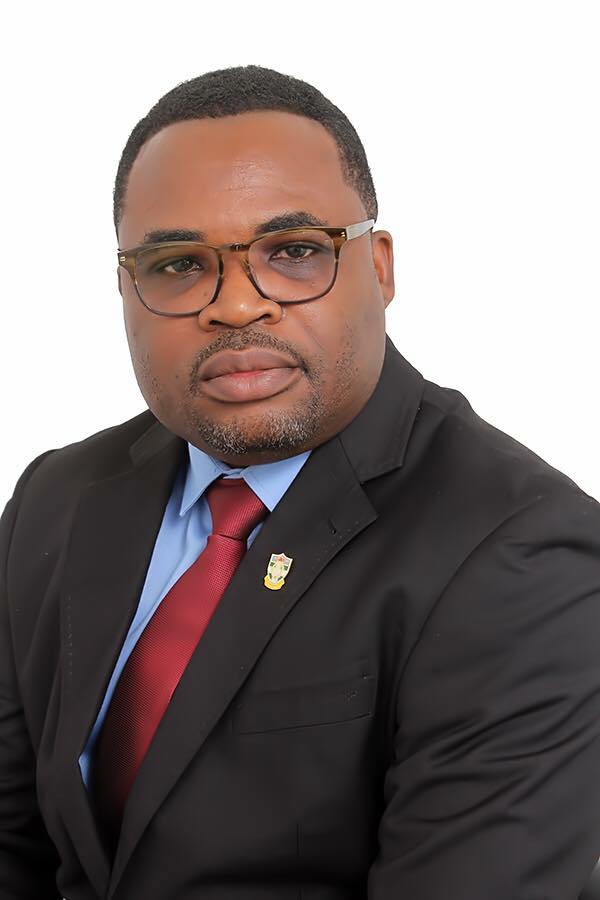
My dear friend,


Interesting, insightful, educative, memorable and “fact-full”.
I have read extensively on the topic of the 2nd Republic and missed some of the facts and chronology of this article.
I sincerely appreciate the writeup. Kudos.
I shall have time to read others of your articles. Congratulations and best regards.